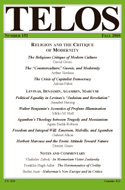From Telos 152 (Fall 2010), Agata Bielik-Robson’s “A Broken Constellation: Agamben’s Theology between Tragedy and Messianism.” Read the full version at TELOS Online website.
 This article analyzes the following constellation of concepts from a theologico-philosophical perspective: “state of exception,” “bare life,” and “the remnant.” Recently employed in the work of Giorgio Agamben, none of these concepts is his own coinage. Agamben borrowed “state of exception” from Carl Schmitt’s Political Theology, “bare life” from Walter Benjamin’s Critique of Violence, and “the remnant” from biblical sources, which include Isaiah and the letters of Saint Paul. Nevertheless, the reemergence of these concepts within Agamben’s system provides each with an altered meaning, which emerges only through interplay with the others. Agamben claims to be offering us in this way a new constellation of radical messianic hope. Bielik-Robson’s intention is to examine critically Agamben’s assemblage of ideas under what Gershom Scholem called “the severe light of the canonical,” and ascertain whether it delivers what it promises—be it even the weakest spark of messianic power.
This article analyzes the following constellation of concepts from a theologico-philosophical perspective: “state of exception,” “bare life,” and “the remnant.” Recently employed in the work of Giorgio Agamben, none of these concepts is his own coinage. Agamben borrowed “state of exception” from Carl Schmitt’s Political Theology, “bare life” from Walter Benjamin’s Critique of Violence, and “the remnant” from biblical sources, which include Isaiah and the letters of Saint Paul. Nevertheless, the reemergence of these concepts within Agamben’s system provides each with an altered meaning, which emerges only through interplay with the others. Agamben claims to be offering us in this way a new constellation of radical messianic hope. Bielik-Robson’s intention is to examine critically Agamben’s assemblage of ideas under what Gershom Scholem called “the severe light of the canonical,” and ascertain whether it delivers what it promises—be it even the weakest spark of messianic power.
In the end, Bielik-Robson claims that Agamben’s attempt constitutes no more than a travesty of the messianic idiom. Instead of building one constellation, Agamben tells two parallel stories: the tragic narrative of nuda vita, with the paradigmatic case of homo sacer, and the messianic counternarrative of il resto, which draws on an emphatically non-tragic tradition of Jewish thinking. Agamben does not offer any convincing synthesis of these two narratives, and these two stories, taken in conjunction, result in a mutually neutralizing collapse: an anti-climactic eschatological vision that Bielik-Robson calls a post-tragic apocalypse.



